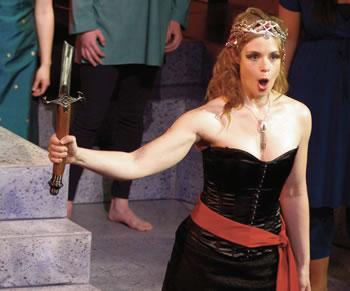The Right Key
Opera singer Anne Jennifer Nash ’96 takes a broad-based approach to her art
by George Fitting ’10
June 29, 2010

At the University of Michigan in March, Anne Jennifer Nash ’96 sang the title role of the sorceress Armide in the opera by Christoph Willibald Gluck.
Anne Jennifer Nash ’96 came to Dickinson from Pittsford, N.Y., with the vague notion of taking a pre-veterinarian route because she loved horses but soon found herself on the way to becoming one of the most successful vocalists to pass through the music program in recent decades.
“I always enjoyed performing growing up—putting on shows in my parents’ living room and singing in church choir and highschool musicals,” says Nash, a soprano who double majored in French and music. “But I had so many varied interests that I wanted to go to a college where I could also study language and do science.”
Nash’s Dickinson education has changed the way she looks at music. She was encouraged to find places for her two majors to overlap and wrote her French thesis on a medieval musician. “The value of my music major now is that from a liberal-arts setting, I feel like when I look at a new piece of music I’m not just seeing the notes on the page,” says Nash, who graduated Phi Beta Kappa and magna cum laude. “My interest is much broader: I want to know what was happening politically at the time, the poet and composer’s backgrounds and the context of the piece.”
Her liberal-arts approach makes Nash stand out among professional singers.
Richard and Judith Pinkerton Shuman, both class of ’57, met Nash two years ago at a vocal workshop at the Eastman School of Music in Rochester, N.Y., and were impressed by her talent and her academic background.
“It’s our assessment that she possesses qualities characteristic of first-rank singers, a calibrated mastery of vocal production,” he says. “Anne’s example illustrates an alternate path enriched in ways that, while not of immediate benefit to a performing artist, predispose a maturing person to notice and shape possibility.”
That sense of possibility has led to roles in works by Mozart to Stravinsky with the Opera Company of Philadelphia, the Florentine Opera Company of Milwaukee, Lake George Opera, Bard Music Festival, Chatauqua Opera, Aspen Opera Theatre, the National Opera Company and Opera New Jersey, among others. Nash is the winner of the Aspen Music Festival Voice Competition and the Rising Star Recital Series competition.
This summer she will be a fellow with Songfest at Pepperdine University, working with American composers Lori Laitman, John Musto and Tom Cipullo. Nash credits her one-on-one studio training with Associate Professor of Music Lynn Helding as a factor in her success. “I’m very lucky to have studied with her and worked with her at that age. Everything since then has been building on that foundation,” she says.
Nash stood out for Helding as well. “She was very serious about her voice and was one of the rare few who actually took lessons over the summer,” says Helding. “Singers should be like athletes. They need to keep in shape.”
Under Helding’s guidance, Nash played the part of Belinda in Dickinson’s first and only opera production, Henry Purcell’s Dido and Aeneas. “That was my first exposure to opera, and I loved it,” says Nash.
She also played Rapunzel in Stephen Sondheim’s Into the Woods. “She had a great scream as Rapunzel—a singing scream, a very high-pitched high note,” Helding recalls.
Truman Bullard, professor emeritus of music, was playing in the pit orchestra during these performances but enjoyed working with Nash as the director of Dickinson’s choir and chamber choir. “She had a lovely solo voice as an undergrad,” he says. “I was always extremely confident that she’d give her best at rehearsal and performance.”
After graduating from Dickinson, Nash attended the prestigious Peabody Conservatory of Music in Baltimore, where she refined her vocal technique and earned a master’s degree under soprano and two-time Grammy nominee Phyllis Bryn-Julson.
“When she went to Peabody, her voice grew into something really extraordinary,” says Bullard. He became the director of the Harrisburg Choral Society after retiring in 2000 and invited Nash to be the soprano soloist in Ludwig van Beethoven’s Mass in C Major and in Joseph Haydn’s Creation. “Bryn-Julson had helped her create this beautiful, flexible, supremely in-tune voice,” he says. “She had wonderful intonation.”
Nash was a fellowship student at the Aspen Music Festival and School for three summers while at Peabody, where she met Julliard vocal coach W. Stephen Smith and ended up working with him for eight years.
Nash is now at the University of Michigan working on her doctor of musical arts, the music equivalent of a Ph.D., studying with Freda Herseth and Martin Katz and managing her own studio of 20 students. “I have the express intent in the next five years or so of going back and teaching at a place like Dickinson,” she says. “I really want to experience being a performer, a teacher and a colleague in an interdisciplinary setting.
“There are so many different ways to make a living, so to speak, in music, and it’s been a fantastic journey that really was sparked by those around me at Dickinson,” Nash adds. “They just encouraged me to explore as many avenues as possible—which is what I’ve done—and it’s been a success.”
Published June 29, 2010